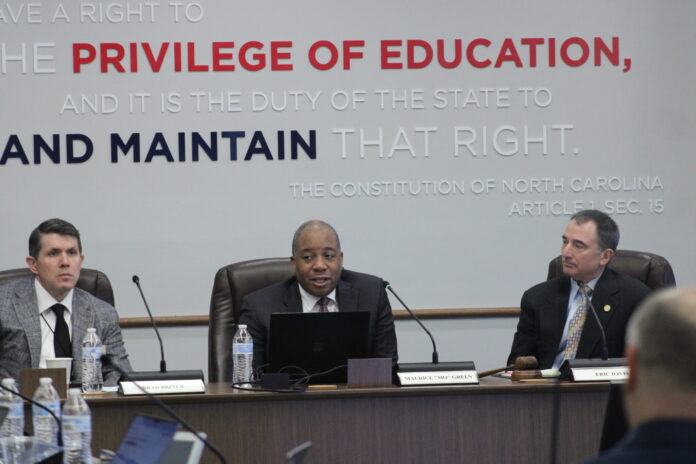Chairman of the North Carolina State Board of Education Eric Davis and North Carolina Superintendent of Public Instruction Maurice “Mo” Green are deeply concerned by the Charter Schools Review Board provisions in the latest versions of House Bill 832 and Senate Bill 254.
Charter schools are public schools. While we remain steadfast in our support for high-quality charter schools as valuable choice models within our public school system, we believe that several provisions in the bills violate the North Carolina Constitution and risk undermining public confidence in the integrity, oversight, and unity of North Carolina’s public school system.
Constitutional authority and legal concerns
The North Carolina Constitution entrusts the State Board of Education with the responsibility to “supervise and administer the free public school system and the educational funds provided for its support” (N.C. Const. Art. IX, Sec. 5) and designates the State Superintendent as its “chief administrative officer” (N.C. Const. Art. IX, Sec. 4).
Charter schools are public schools and fall under this constitutional mandate. During debate of the latest version of House Bill 832, reference was made to a restriction on this constitutional authority, pointing to the words “subject to the laws of the General Assembly” as they appear in this article. However, this language does not grant unlimited authority to the General Assembly to ignore the constitutional authority of the State Board and State Superintendent.
In 2018, the North Carolina Supreme Court clarified that “the General Assembly has the authority to make ultimate educational policy determinations and to enact legislation providing for the management and operation of the public school system, so long as that legislation does not deprive the Board of responsibility for the general supervision and administration of the public school system or deprive the Superintendent of the responsibility for directly administering the operations of that system” (N.C. State Board of Education v. State, 371 N.C. 170, 181, 2018, emphasis added).
The provisions in House Bill 832 and Senate Bill 254 unconstitutionally propose to transfer core responsibilities of oversight, accountability and rulemaking from constitutionally established authorities to a non-constitutional body — the Charter Schools Review Board (CSRB).
Specifically, the bill raises significant constitutional concerns in the following areas:
- Rulemaking Authority: Stripping the State Board of its full rulemaking power — reducing it to a limited veto — violates the Constitution’s provision that grants the Board the authority to make “all needed rules and regulations” (N.C. Const. Art. IX, Sec. 5) governing the public school system.
- Oversight of Federal Funding: The proposed removal of the State Board and Superintendent’s authority to conduct hearings and make findings and recommendations on the use of federal funds in charter schools not only violates constitutional oversight responsibilities but may also place North Carolina out of compliance with federal law.
- Management of the Office of Charter Schools: Reassigning management of the Office of Charter Schools from the Superintendent to a non-constitutional board disrupts the unified administration of public education and violates established case law affirming the Superintendent’s executive role.
- Support for Low-Performing Charter Schools: Delegating oversight of struggling schools to the CSRB undermines the State Board’s constitutional duty to ensure that every school — district or charter — receives the support needed to provide students with a sound basic education to which they are constitutionally entitled. See Leandro v. State, 346 N.C. 336 (1997).
Why this matters
This legislation threatens to weaken North Carolina’s ability to fulfill its constitutional promise to every child. It limits the tools and authority the State Board and Superintendent rely on to:
- Ensure that all public-school students, regardless of setting, receive the education to which they are entitled;
- Provide robust and transparent oversight of public funds, including state and federal dollars;
- Intervene when schools are struggling and help them improve before students suffer the consequences; and
- Maintain a cohesive public school system that parents and communities can trust.
A commitment to charter schools—and to all public school students
We want to be clear: we believe in the promise of high-quality charter schools as innovative public schools that can meet student needs in diverse ways. We celebrate the many charter schools across North Carolina that are thriving and providing an excellent education. These schools deserve meaningful guidance, partnership and support — not fragmented governance that limits their access to state-level expertise and resources.
We also know that some charter schools face serious challenges. It is our constitutional responsibility to provide oversight, guidance and, when necessary, intervention to help them succeed. Stripping away that capacity only puts vulnerable students at greater risk and erodes the confidence of parents when they are making educational choices.
We remain committed to strengthening relationships with charter school leaders, engaging families and fostering collaboration across the public school system. As a direct result of the state Superintendent’s efforts, starting this summer, charter leaders will be attending district superintendents’ meetings and vice-versa to further strengthen those relationships.
The draft strategic plan, which is scheduled to be approved by the State Board in August 2025, outlines further efforts to make that commitment a reality, including creating a cross-sector Innovation Leadership Council (that would be composed of charter leaders, public school district leaders, lab school leaders and NC Department of Public Instruction staff) to guide knowledge transfer and scale-up promising innovative efforts. These and other collaborative efforts will enhance the educational opportunities that all public schools can provide for students. But collaboration requires shared purpose and consistent oversight. This legislation pushes us in the opposite direction — toward fragmentation, confusion and diminished public trust.
We urge lawmakers to reconsider these provisions in the latest versions of House Bill 832 and Senate Bill 254 and to work with us — on behalf of every student and every parent in North Carolina — to ensure that the public school system remains strong, accountable and worthy of our communities’ confidence.
